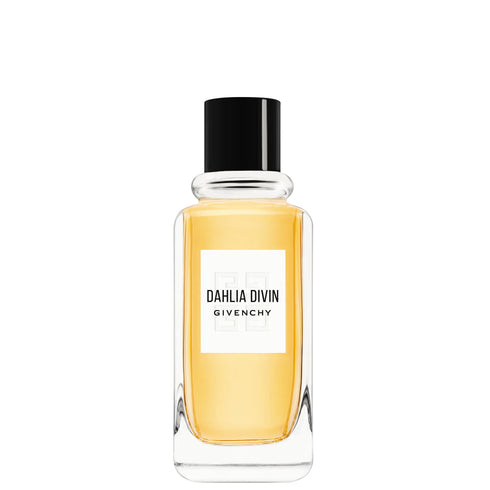- Home
- Givenchy Dahlia Divin - Tester - HAUTE Parfums

Givenchy Dahlia Divin - Tester - HAUTE Parfums
Dahlia Divin stems from the elegance of Haute Couture, revealing a divine femininity. A quintessentially sensual Eau de Parfum inspired by golden and olfactory harmonies.
This powerfully feminine fragrance takes off with the juicy notes of a Mirabelle Plum accord. Then the heart of Dahlia Divin bursts into a heady bouquet filled with the floral accents of Sambac Jasmine Absolute. While at the base, Sandalwood Essence infuses the scent with sensual woody depths.
Les Mythiques—Givenchy's iconic fragrances in a timeless heritage collection.
-
Givenchy Dahlia Divin eau de parfum
- Notes: Plum, Sambac Jasmine Absolute, Sandalwood Essence
- Original packaging is for reference only and is not included.
- 150 gram (weight)
- RRP £131.00 per 100ml
The lists of ingredients that make up the composition of parfums products are regularly updated. Commonly used ingredients are:
Alcohol ● Parfum (Fragrance) ● Aqua (Water) ● Alpha-isomethyl Ionone ● Benzyl Salicylate ● Limonene ● Linalool ● Ethylhexyl Methoxycinnamate ● Diethylamino Hydroxybenzoyl Hexyl Benzoate ● Citronellol ● Geraniol ● BHT ● Oil Extracts ● Citral ● Benzyl Alcohol ● Benzyl Benzoate ● Eugenol ● Coloring Agents ● Tocopherol ● DPG
The manufacturer is responsible for the ingredients of the product. We recommend checking the list of product ingredients directly on the manufacturer's website due to potential changes. Periodic updates to EU regulations could demand the for manufacturers to re-formulate existing fragrances to meet new regulations.
Be aware that large neck roller bottles may contain polymers to reduce leakage in according to regulatory packaging requirements. Roller bottles should not be transferred into spray bottles.
Allergies or Sensitivities:
If you suffer allergies or sensitivies, and before using a perfume product or the long-term use of fragrances, please check the latest updated list of ingredients from the original manufacturer to be certain that the ingredients are suitable for your personal use as they may differ, be updated or changed with new released batches.
Perfumes can also be used on clothes instead of skin to reduce direct skin contact. However, due to alcohol content or thickening agents, perfumes can have a small negative effect on fabrics:
The (EU) Cosmetics Regulation 1223/2009 lists the 26 most-known allergenic substances, which you can find in the link below:

